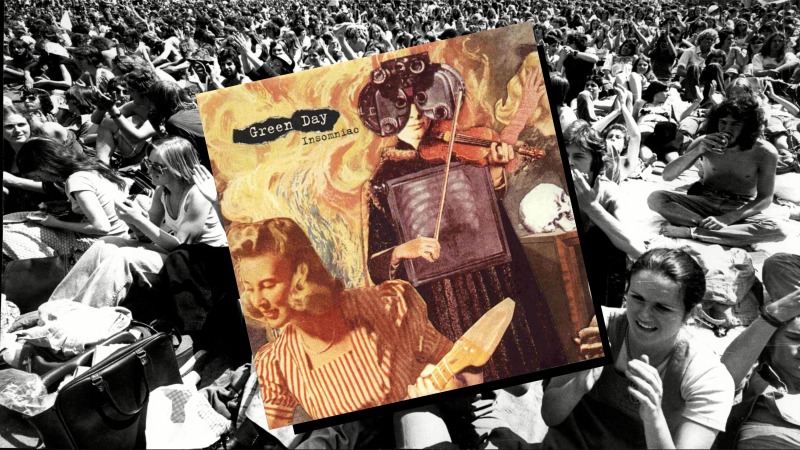Time Capsule: Green Day, Insomniac
In October 1995, the Bay Area pop-punk legends responded to sudden superstardom with their angriest, bleakest, and most urgent collection of songs.

It’s a safe wager that no scatologically titled album ever cast a longer shadow than Green Day’s Dookie. The Bay Area trio’s 1994 major-label debut stumbled upon meteoric success in the wake of Kurt Cobain’s death and the impending decline of grunge, permeating the alt-rock airwaves with a pungent, skunky cloud of pop melodicism mixed with a punk edge and slacker snottiness. Three decades later, we recognize the significance of Dookie and the inextricable role that relatable, straightjacket singles like “Basket Case,” “Longview,” and “When I Come Around” played in both the evolution of pop-punk and the landscape of nineties alternative rock. At the time, though, as Billie Joe Armstrong, Mike Dirnt, and Tré Cool set out to make the record that would become Insomniac, that auspicious future must’ve felt anything but certain. Facing the pressures of sudden superstardom, burned out from touring and addiction, and wounded by accusations of selling out, Green Day responded with an angry, bleak, and urgent collection that suggested all might not be well in the “smoked-out, boring rooms” scattered across Dookie.
For all of Insomniac’s pissed-off aggression, the album actually snapshots Green Day going into a strategic retreat rather than an all-out offensive aimed at their suffocating circumstances. Success had largely sapped the fun out of playing shows, and the band found themselves shunned as punk pariahs among the Berkeley scene that had nurtured them since their Sweet Children beginnings. Disenchanted with the hysteria of what Armstrong once sarcastically dubbed “winning the lottery,” the trio turned to their next batch of songs to try and gain back some sanity as the outside world spiraled further out of control. Dirnt has described Insomniac as a collection of individual feelings that the band could grapple with, process, and move on from. While Armstrong bashfully insisted that writing the album wasn’t like “self-therapy,” thinking of Insomniac in those terms helps explain why this half-hour, breakneck purge of a record lands like such a striking departure from its feces-flinging predecessor. After Dookie’s lighthearted, juvenile blast through the timeless bullshit of adolescence, Insomniac finds the boys of Green Day (now, gasp, family men) peeling themselves off that velcro couch in their parents’ basements and dealing with problems threatening to linger longer than a cloud of pot smoke.
Lead track “Armatage Shanks,” which takes its name from a British toilet manufacturer, wastes no time in dropping fans directly into Green Day’s troubled headspace. Tee’d up by Cool’s opening salvo, Armstrong informs listeners that his outlook has matured (read: worsened) from the innocuous, childish nihilism of Dookie (“I declare I don’t care no more”) to a more practical cynicism (“I must insist on being a pessimist”) in the aftermath of the band’s stupefying success. Confusion, rejection, and alienation are the sentiments of these cornered artists. Like the majority of the album, emotional urgency begets high-octane velocity, the foot only coming off the gas to let Cool’s rapid fills or Dirnt’s vibrant basslines surface like fresh graffiti on the blank spaces of a thoroughly tagged wall. It’s maybe not such a wonder that their next album, Nimrod, would get slapped with the “indulgent” label after Insomniac’s songs refuse to loiter even an extra second or two.
As Insomniac makes clear, Armstrong and company rarely need more than a couple minutes to flex their chops. Macabre humor lands as the deadbeat heir in “Brat” questions if boredom will be the undoing of his financial scheme to wait out his aging parents. “Well, I am just a mutt, and nowhere is my home,” Armstrong introduces himself on “No Pride,” reminding us why he’s still our poet laureate of self-deprecation, as he negotiates a land where “dignity’s a landmine,” all hope has gone missing, and “values … turn to shit.” On famously mislabeled second single “Stuck with Me,” a deft lyrical tweak makes us quickly realize that the song’s protagonist isn’t only in danger of being outclassed (“I’m just alright”) but cast out altogether (“I know I’m not alright”). And that’s the grave difference between Dookie and Insomniac. As the latter plays out and the evidence piles higher, we get a whiff of peril that didn’t exist in the former. There’s clearly a ledge ahead, and listeners can’t be sure if these songs are the band slamming on the brakes or lead-footing the accelerator.
-

-

-

-

-

-

-

-

-

-

-

-

-

-

-

-

-

-

-

-

-

-

-

-

-

-

-

-

-

-

-

-

-

-

-

-

-

-

-

-








































